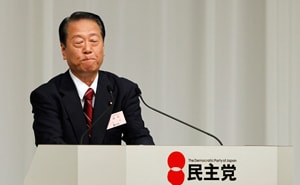NEWSMAKERS: JAPAN
By Thomas Clouse
 |
|
Ozawa: Failed to unseat Japan’s prime minister |
Japanese prime minister Naoto Kan retained leadership of his political party and the country after political powerbroker Ichiro Ozawa unsuccessfully challenged him for his position in a vote of members of the Democratic Party of Japan (DPJ). The vote comes only three months after Kan took office and just over a year after the party won control of the prime minister’s office by gaining a majority in the lower house of parliament. The DPJ’s first president, Yukio Hatoyama, resigned in June after breaking an election pledge to relocate US military bases off of the southern island of Okinawa.
After taking over from Hatoyama, Kan initially enjoyed popularity and a reputation for practicality. His support flagged, however, after he suggested lawmakers begin working on measures to address the country’s massive public debt, which is roughly double the size of its GDP. In July the DPJ lost control of the upper house of parliament. Kan’s rival Ozawa advocated increased spending—and borrowing if needed—to stimulate the economy, as well as intervention in currency markets to make Japanese products more competitive in overseas markets. Kan’s victory drove the yen to a 15-year high against the US dollar.
Shortly after his victory, Kan surprised analysts and investors by intervening in currency markets for the first time in six years. The government bought US dollars to weaken the yen. Kan also reshuffled his cabinet, giving some positions to Ozawa supporters while retaining his finance minister Yoshihiko Noda, who oversaw the currency intervention.
In early September, before the election, Kan’s previous cabinet approved a 915 billion yen ($10.7 billion) stimulus package designed to increase consumption, create jobs for recent graduates and encourage investment in green technologies. Japan also upwardly revised its second quarter GDP growth rate last month to an annualized 1.5%. The country’s consumer price index fell by 1.1% year-on-year in July, however, reviving fears of deflation.



